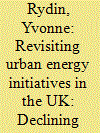|
|
|
Sort Order |
|
|
|
Items / Page
|
|
|
|
|
|
|
| Srl | Item |
| 1 |
ID:
127999


|
|
|
|
|
| Publication |
2014.
|
| Summary/Abstract |
Around the world there is increasing interest from government and industry in the potential for Carbon Capture and Storage (CCS) technologies to play a part in decarbonisation. This paper examines how people with little previous exposure to CCS technology, frame and discuss it, and how in the absence of information, ideas, notions, values and experiences shape opinion. We present data from a series of focus groups held with environmental activists, planning councillors, and adult and youth community group members in London in 2012. We found that views on CCS are shaped strongly by wider factors, particularly trade offs between different energy futures. Lay-critiques were similar to those put forward by environmental groups and were strongly framed by conceptions of nuclear power. We argue that although there is little public disquiet concerning this technology in private opinions were generally negative. This, and the use of nuclear power as a framing device, may present a challenge to policy-makers and industry committed to implementing CCS while promoting education as the main mechanism for public acceptance.
|
|
|
|
|
|
|
|
|
|
|
|
|
|
|
|
| 2 |
ID:
166497


|
|
|
|
|
| Summary/Abstract |
In the first decade of the 21st century, there was considerable interest in the potential for reducing the reliance on centralised energy systems and introducing greater decentralisation through localised initiatives, particularly in urban areas. A range of such initiatives were evidence of an emerging movement for bottom-up change in energy systems. This involved a variety of actors, technologies, economic models and modes of engagement with the public. Indeed, research undertaken in the UK found over 50 possible pathways for change based on such urban energy projects. However, the following decade has seen considerable changes in the context for such initiatives, particularly with regard to national policy frameworks. Returning to a database collected in 2010–11, this paper analyses the nature of the projects that have survived and those that have not. It finds that the hope of localised urban action for changing energy systems rests largely with community-based projects, but that these are fragile, with limited capacity and dependent on having a sound financial model for their survival. The paper concludes with suggestions for how such localised urban action could be reinvigorated but also assesses the current role of such local action.
|
|
|
|
|
|
|
|
|
|
|
|
|
|
|
|
|
|
|
|
|